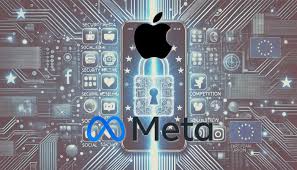In a dispute stoked by the European Union’s escalating attempts to persuade the iPhone manufacturer to open up to products from tech competitors, Apple said that Meta Platforms’ requests for access to its operating software threatened user privacy.
Under its new digital competition law, the executive commission of the 27-nation EU is creating “interoperability” guidelines for Apple.
The interoperability requirements would guarantee that services like wireless file transfers or smartwatches function as seamlessly with iPhones as AirDrop or Apple Watches do.
The Digital Markets Act, a set of regulations from the EU, attempts to prevent Big Tech “gatekeeper” firms from controlling markets and to encourage fair competition in digital marketplaces.
Late on Wednesday, the commission released some guidelines for how Apple could integrate its iOS operating system with other devices.
Laptops 1000Apple responded by stating that it is “concerned that some companies… may attempt to abuse the DMA’s interoperability provisions to access sensitive user data—with data practices that do not meet the high standards of data protection law held by the EU and supported by Apple.”
Meta was singled out by the business, which claimed that it had submitted at least 15 requests “for potentially far-reaching access to Apple’s technology stack” that would weaken customer privacy safeguards.
“Facebook, Instagram, and WhatsApp could enable Meta to read on a user’s device all of their messages and emails, see every phone call they make or receive, track every app that they use, scan all of their photos, look at their files and calendar events, and log all of their passwords,” the company stated in a report if those requests were approved.
Facebook and Instagram’s owner, Meta, retaliated.
Andy Stone, the spokesperson for Meta, stated in a post on X that “this is what Apple is really saying: they don’t believe in interoperability.”
“In actuality, Apple always defends itself on fictitious privacy grounds when it is accused of anticompetitive behavior.”
The proposed regulations from the European Commission, based in Brussels, suggest a method modeled after Apple’s current “request-based process,” where developers request access to features and functionalities.
A “fair and impartial conciliation” procedure should be in place to resolve disputes over technical matters, and Apple should designate a “dedicated contact” to manage requests and offer updates and comments.
The commission is now seeking public input on the ideas by January 9th, especially from any businesses that have requested interoperability from Apple or are considering doing so.

















